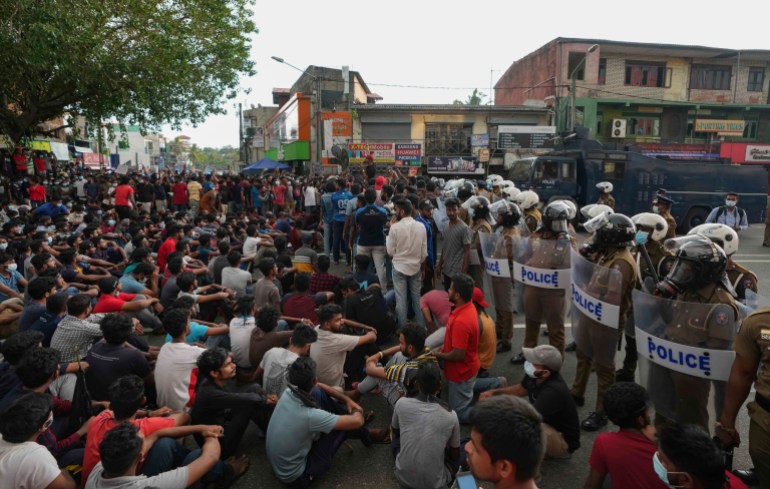Sri Lanka president drops brother as FM amid protests over crisis
Ali Sabry to be the new finance minister, replacing Gotabaya Rajapaksa’s brother Basil as cracks emerge in ruling coalition.

Sri Lankan President Gotabaya Rajapaksa has dropped his brother as finance minister after calling for a unity government as protests against an economic crisis persist and cracks emerge in the ruling coalition.
The debt-laden country, run by Rajapaksa and his brothers in top positions, is struggling to pay for imports of fuel and other goods due to a scarcity of foreign exchange, leading to hours-long power cuts and a shortage of essentials.
Keep reading
list of 4 itemsPolice fire tear gas as Sri Lanka protesters defy curfew
Photos: Sri Lanka protesters defy curfew after social media ban
Can the dire economic crisis in Sri Lanka be solved?
Street protests against the government continued on Monday with crowds gathering in several towns, including in southern Tangalle where people holding posters and the national flag broke through police barricades, local media reported.
“Four ministers were appointed to ensure parliament and other tasks can be conducted in a lawful manner until a full Cabinet can be sworn in,” Rajapaksa’s media office said in a statement on Monday after cabinet ministers resigned in a bid to resolve the crisis.
It said Justice Minister Ali Sabry would be the new finance minister, replacing Gotabaya’s brother Basil Rajapaksa, who was due to visit the United States this month for talks with the International Monetary Fund (IMF) for a loan programme.
Previous ministers of foreign affairs, education and highways will keep their positions.

Call for unity gov’t
Earlier on Monday, the Sri Lankan president called for a unity government to deal with the country’s economic crisis, as cabinet ministers and the central bank governor offered to resign and stock trading halted twice because of a plunge in share prices.
“The president invites all political parties in parliament to accept cabinet posts and join the effort to seek solutions to the national crisis,” Rajapaksa’s office said in a statement on Monday.
“Considering this a national need, the time has come to work together for the sake of all the citizens and future generations,” it added.
The statement stressed that solutions to the deepening crisis should be found “within a democratic framework”, as hundreds were joining spontaneous demonstrations in cities, towns and villages.
The invitation to the opposition came after 26 cabinet ministers – every member except the president’s elder brother, Prime Minister Mahinda Rajapaksa – submitted letters of resignation at a late-night meeting on Sunday.
The move cleared the way for the all-powerful political clan to seek to shore up its position.
The Central Bank of Sri Lanka governor, Ajith Nivard Cabraal, on Monday joined the long list of resignations. “In the context of all cabinet ministers resigning, I have today submitted my resignation as Governor,” he said on Twitter.
The Colombo Stock Exchange suspended trading twice on Monday morning due to a sharp fall in the benchmark share price index.
Widespread street protests over the economic hardship faced by the people have continued despite a weekend curfew and Rajapaksa declaring a state of emergency on Friday.
The island nation of 22 million, off India’s southern tip, is also grappling with soaring inflation after the government steeply devalued its currency last month before talks with the IMF for a loan programme.
The country’s expenditure has exceeded its income under successive governments while its production of tradable goods and services has been inadequate. The twin deficits were badly exposed by the COVID-19 pandemic that crippled its economic mainstay, the tourism industry.

‘Go home Gota’
Throughout Sunday, hundreds of people staged noisy but peaceful demonstrations in towns across the island of 22 million, denouncing Rajapaksa’s handling of the crisis.
“Go home Gota, go home Gota,” protesters shouted in Rajagiriya, near the national parliament, while in Negombo, near the international airport, people chanted, “Gota fail, fail, fail”.
Sunday’s full-day curfew prevented larger protests that had been organised through social media platforms such as Facebook, Twitter and WhatsApp, all of which were blocked by the government.
The platforms were unlocked and the partial internet censorship ended after 15 hours, as the Human Rights Commission of Sri Lanka ruled the ban was illegal.
Activists said they would hold larger demonstrations in several key towns on Monday to force the once hugely-popular Rajapaksa and his family to step down.